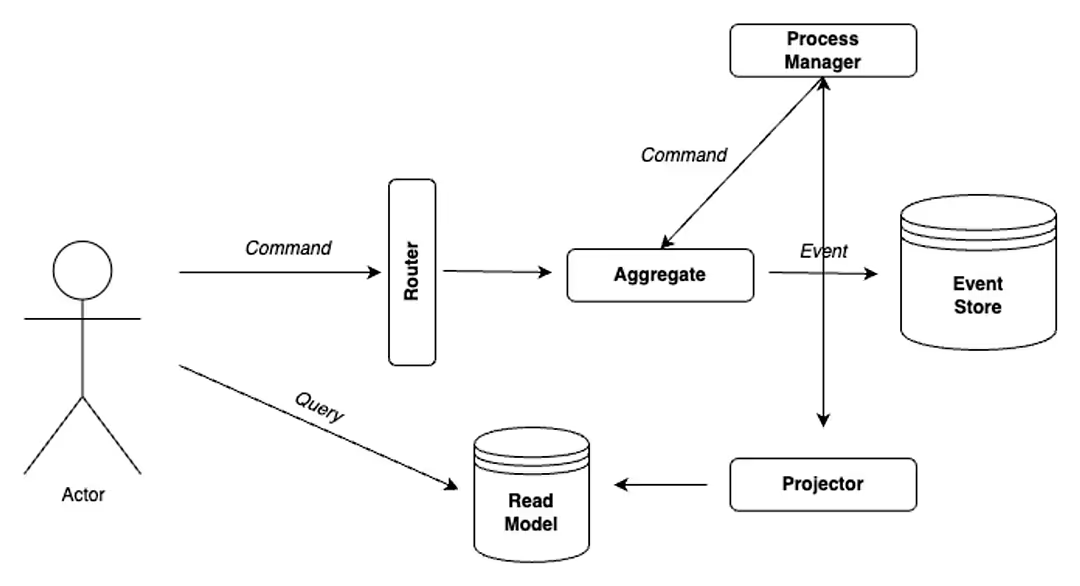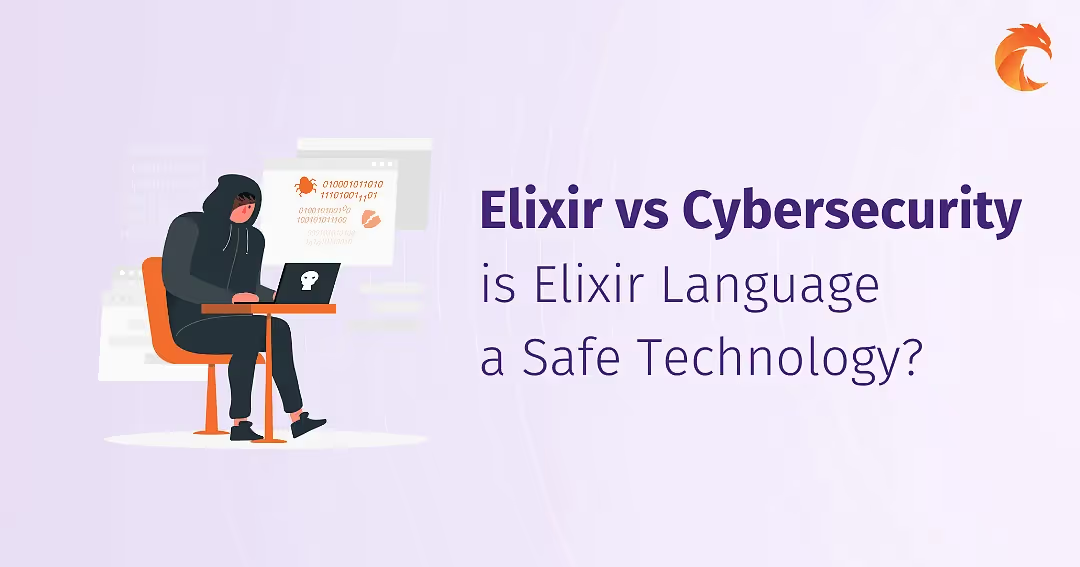Segregate Responsibilities with Elixir Commanded


Explore how Elixir's Commanded library revolutionizes application development through CQRS and Event Sourcing, offering powerful capabilities for audit, time travel, and seamless event-driven architecture.
Responsibility segregation in Elixir programming language
CQRS
Command Query Responsibility Segregation (CQRS) at a conceptual level, emphasizes that actions leading to state changes are designated as commands, while data retrieval actions are termed queries. Due to the distinct operational demands of executing commands and queries, developers are encouraged to employ diverse persistence strategies for handling each, thus segregating their responsibilities.
Event Sourcing pattern
Event Sourcing is a pattern for storing data as events in an append-only log called event store. While this definition may seem straightforward, it overlooks a crucial aspect: by storing events, the context surrounding each event is retained. For instance, from a single piece of information, you can discern not only that an email was sent but also the reason behind it. In contrast, in alternative storage patterns, the context of business logic operations is often lost or stored separately. The current state of an entity can be reconstructed by sequentially replaying all events in the order they occurred. The information within the system is derived directly from these events.
The proposal of the CQRS pattern coincided with the introduction of Event Sourcing to the public intentionally. Unlike state-based persistence, where circumventing the use of the domain model for queries may be feasible, such an approach becomes challenging, if not impossible, in event-sourced systems. This is due to the absence of a singular location where the complete state of a domain object is stored.
Pros of event sourced system
What are the benefits of those? Apart from others:
Eventual consistency
Eventual consistency entails the concept that reads or queries may not be instantly synchronized with writes. This phenomenon can also arise in systems that do not utilize event sourcing, often due to database replication delays. In essence, the data in your read storage eventually catches up with the latest writes, which could take milliseconds, seconds, minutes, etc. Given this, event sourcing systems frequently encounter eventual consistency challenges, necessitating readiness to address the trade-offs between eventual and strong consistency.

In the context of Elixir programming, the Commanded package provides a powerful framework for implementing CQRS and Event Sourcing patterns. Let's explore how Commanded facilitates the implementation of these patterns in Elixir applications.
Commanded in practice
Let's explore the application code and check how to implement event sourcing in our own elixir applications
As always when adding a new package we need to adjust our mix.exs file:
def deps do
[
{:commanded, "~> 1.4"},
{:jason, "~> 1.3"} # Optional
]end
Event store
Next, we must decide what store to use to persist our events. We have two primary options to choose from:
Both options are great and have their pros and cons but to make things simpler I’ll suggest using PostgreSQL adapter in the beginning.
We will add another dependency for that:
def deps do
[
{:eventstore, "~> 1.4"}
]end
as well as MyApp.EventStore module which we will include in our supervision tree:
# event_store.exdefmodule MyApp.EventStore do
use EventStore, otp_app: :my_app
def init(config) do
{:ok, config}
endend# application.exdefmodule MyApp.Application do
use Application
def start(_type, _args) do
children = [
MyApp.EventStore
]
opts = [strategy: :one_for_one, name: MyApp.Supervisor]
Supervisor.start_link(children, opts)
endend
Finally, a bunch of configurations to set up our store:
config :my_app, MyApp.EventStore,
serializer: EventStore.JsonSerializer,
username: "postgres",
password: "postgres",
database: "eventstore",
hostname: "localhost"
config :my_app, event_stores: [MyApp.EventStore]
And now we are good to go and run mix tasks for our event store initialization:
mix do event_store.create, event_store.init
By Your Command! - Commanded library quickstart

Commands & Events
In the simplest words, commands represent intentions to perform actions, while events represent the outcomes of those actions.
A command should include a field that uniquely identifies the aggregate instance, such as "competition_id." Because commands are standard Elixir structs, you can improve the process of defining structs, enforcing mandatory keys, or performing validations by employing libraries like typed_struct or domo. This approach reduces the need for excessive boilerplate code.
defmodule MyApp.Commands.CreateCompetition do
@moduledoc """
Create a new competition command
"""
use Domo
@type t() :: %__MODULE__{
competition_id: nil | binary(),
name: binary(),
url: url(),
user_id: binary()
}
defstruct [
:competition_id,
:name,
:url,
:user_id
]end
Domain events signify significant occurrences within the scope of an aggregate. They are conventionally named in the past tense, such as "competition created".
For each domain event, create a separate module and define its fields using defstruct. Ensure that each event also includes a field to uniquely identify the aggregate instance, such as “competition_id”
Additionally, remember to implement the Jason.Encoder protocol for the event struct to enable JSON serialization, as illustrated below.
defmodule MyApp.Events.CompetitionCreated do
@moduledoc """
Competition created event
"""
@derive [Jason.Encoder]
@type t() :: %__MODULE__{
competition_id: binary(),
name: binary(),
url: binary(),
user_id: binary()
}
defstruct [
:competition_id,
:name,
:url,
:user_id
]end
Aggregates
Aggregates play a crucial role in DDD by defining consistency boundaries within a domain model and encapsulating domain logic. A single aggregate is a cluster of domain objects that are treated as a single unit for the purpose of data changes. In Commanded, aggregate is comprised of its state, public command functions, command handlers functions, and state mutators. As we store events, we have access to a detailed event log of past events handled in our application.
defmodule MyApp.Aggregates.Competition do
@moduledoc """
Competition write model aggregate
"""
use Domo
@type t() :: %__MODULE__{
id: binary(),
name: binary(),
url: binary()
}
defstruct [
:id,
:name,
:url
]
alias MyApp.Aggregates.Competition
alias MyApp.Commands.CreateCompetition
alias MyApp.Events.CompetitionCreated# Public API
def create_competition(%Competition{id: nil}, uid, name, url, user_id) do
event = %CompetitionCreated{
competition_id: uid,
name: name,
url: url,
user_id: user_id
}
{:ok, event}
end# Command handler
def execute(%Competition{id: nil}, %CreateCompetition{} = command) do
%CompetitionCreated{
competition_id: command.id,
name: command.name,
url: command.url,
user_id: command.user_id
}
end# State mutator
def apply(%Competition{} = competition, %CompetitionCreated{} = event) do
%Competition{
competition
| competition_id: event.id,
name: event.name,
url: event.url
}
endend
Dispatchers & Handlers
At the opposite of handling command execution directly inside aggregate, we can use a separate module. A handler accepts both the aggregate and the command undergoing execution. This handler provides the opportunity to validate, authorize, and/or augment the command with supplementary data before executing the relevant function within the aggregate module.
defmodule MyApp.Handlers.CreateCompetitionHandler do
@behaviour Commanded.Commands.Handler
alias MyApp.Commands.CreateCompetition
alias MyApp.Aggregates.CompetitionAggregate
def handle(%CompetitionAggregate{} = aggregate, %CreateCompetition{} = command) do
%CreateCompetition{id: uid, name: name, url: url, user_id: user_id} = command
CompetitionAggregate.create_competition(aggregate, uid, name, url, user_id)
endend
A Router module serves the purpose of dispatching commands to their designated command handler and/or aggregate module.
To create a router module, utilize Commanded.Commands.Router, and proceed to register each command along with its corresponding handler.
defmodule MyApp.Router do
use Commanded.Commands.Router
alias MyApp.Commands.CreateCompetition
alias MyApp.Aggregates.CompetitionAggregate
dispatch CreateCompetition, to: CompetitionAggregate, identity: :competition_idend
Projectors & Projections
The concept involves software components known as Projections and Projectors, which subscribe to the real-time event stream from the events database. Upon receiving an event, the Projection can then translate the data contained within that event into a view model within a designated reporting database.
You have the flexibility to opt for an SQL or NoSQL database, a document store, a filesystem, a full-text search index, or any other storage mechanism. Moreover, you can employ multiple storage providers, tailored to optimize the querying requirements they need to fulfill.
The simplest solution will be using the Commanded Ecto Projections library.
This part will be our read model and if we don't change the default behaviour by ourselves it will be updated asynchronously so after the write model finishes saving events to the event store we can't be sure read models are also updated.
defmodule MyApp.Projectors.Competition do
use Commanded.Projections.Ecto,
application: MyApp.Application,
repo: MyApp.Projections.Repo,
name: "MyApp.Projectors.Competition"
alias MyApp.Events.CompetitionCreated
alias MyApp.Projections.Competition
project %CompetitionCreated{} = event, _metadata, fn multi ->
%CompetitionCreated{name: name, url: url, user_id: user_id} = event
projection = %Competition{name: name, url: url, user_id: user_id}
Ecto.Multi.insert(multi, :competition, projection)
endend
Want to power your product with Elixir? We’ve got you covered.
Related posts
Dive deeper into this topic with these related posts
You might also like
Discover more content from this category
Learn about strategies for perfecting local and remote CI pipelines in Elixir projects. Know the importance of automating checks to reduce developer time spent on repetitive tasks, ultimately leading to more efficient and productive development.
With so much of our life going online now, it's more important than ever to understand cybersecurity - what it is, why it is crucial, and how we can protect ourselves from cyber threats. In this post, I will introduce you to the world of cybersecurity and tell you how Elixir programming language works in this environment.
When we announced Permit.Absinthe last June alongside the Permit 0.3 and Permit.Phoenix 0.3 releases, we described it as a working proof-of-concept - something you could pull from GitHub and play around with for simple APIs. We also shared a pretty honest TODO list of things that were still missing before the library could be considered a real tool for real applications.




